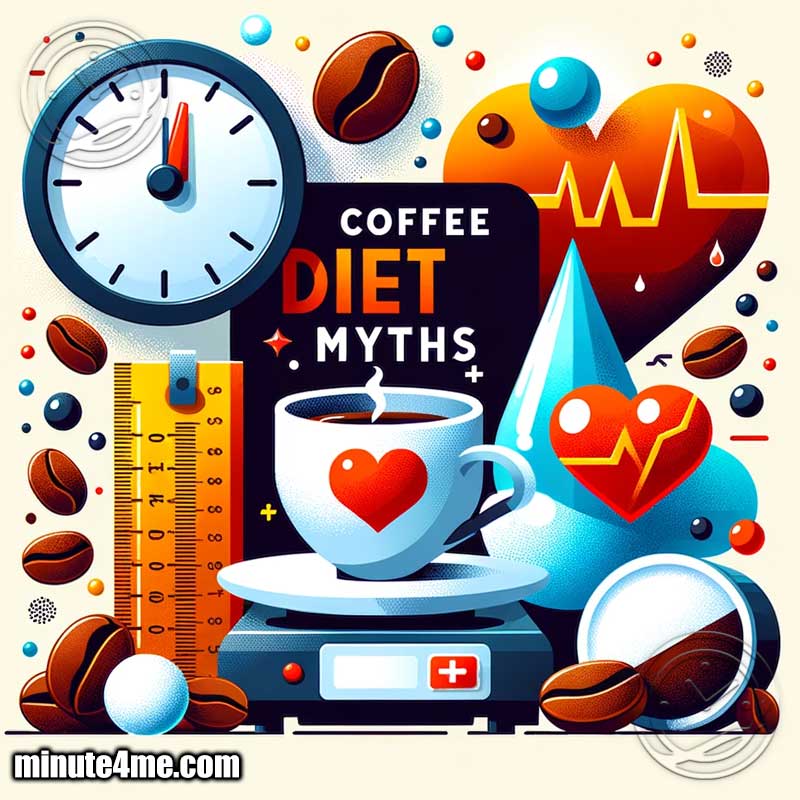The Buzz Around Coffee and Diets
Coffee is more than just a beverage; it’s a ritual for millions around the globe.
Whether it’s the first sip of espresso in the morning or a comforting latte during a break, coffee holds a special place in many cultures.
Yet, with its popularity comes a brew of myths and misconceptions, especially regarding its role in diet and health.
This article aims to filter out the facts from fiction, providing a clear view of how coffee affects our diet and well-being.
Coffee Diet Myths Exposed
The relationship between coffee and health is a topic brewed with controversy and speculation.
While coffee is a staple in many diets, myths surrounding its effects on health and weight management abound.
This section aims to grind down these myths to their true essence, presenting a balanced cup of facts and evidence.
Boost Your Energy & Focus: The Coffee Diet Connection
Discover the groundbreaking Coffee Diet, where your morning brew becomes a powerful ally in your quest for energy and focus….
Myth 1: Coffee Accelerates Weight Loss
One of the most popular myths is that coffee can be a catalyst for significant weight loss.
Here’s what the science says:
- Metabolism Boost: Caffeine, a central component of coffee, is known to stimulate the central nervous system, which can increase metabolism by approximately 3-11%. While this sounds promising, the effect is too minor to produce significant weight loss on its own.
- Appetite Suppression: Some studies suggest that caffeine may suppress appetite in the short term. However, this effect is not strong enough to rely on coffee as a weight loss strategy.
Key Points to Remember:
- Balanced Diet and Exercise: For effective weight loss, coffee should be part of a balanced diet accompanied by regular physical activity.
- Hydration is Crucial: Coffee is a diuretic, which means it can lead to increased urination. Staying hydrated is important, especially if you’re using coffee to support your weight loss efforts.
| Factor | Impact on Weight Loss |
|---|---|
| Metabolism Boost | Minor increase, insufficient alone |
| Appetite Suppression | Short-term effect, not a reliable method |
| Hydration | Essential to counteract diuretic effects |
Myth 2: Coffee Is Unhealthy
Coffee often gets a bad rap in discussions about health.
Yet, an overwhelming amount of research suggests that, when consumed in moderation, coffee can be a healthy addition to your diet.
- Antioxidants and Nutrients: Coffee is rich in antioxidants and contains essential nutrients such as B vitamins, potassium, and riboflavin. These compounds can help protect cells from damage and support overall health.
- Reduced Risk of Chronic Diseases: Regular coffee consumption has been linked to a reduced risk of several chronic diseases, including Type 2 diabetes, Parkinson’s disease, and certain types of cancer.
However, it’s not all black and white:
- Pregnancy and Caffeine: High caffeine intake during pregnancy is associated with increased risks, including pregnancy loss. Women who are pregnant or planning to become pregnant should monitor their caffeine intake carefully.
- Individual Sensitivities: People with certain health conditions or sensitivities may experience negative effects from caffeine, such as increased heart rate, anxiety, or sleep disturbances.
Health Benefits vs. Risks:
- Benefits: Antioxidant content, disease risk reduction, nutrient intake.
- Risks: Increased blood pressure, sleep disturbances, potential pregnancy issues.
5 Must-Try Mediterranean Diet Coffee Recipes
Dive into the soul-stirring essence of Mediterranean coffee culture with "5 Must-Try Mediterranean Diet Coffee Recipes." Beyond a mere beverage,…
Myth 3: Coffee Stunts Growth
This longstanding myth has caused concern among parents and young coffee enthusiasts alike.
The fear that coffee consumption can stunt growth is based on the idea that caffeine affects calcium absorption, a key mineral for bone growth.
However, the evidence does not support this claim.
- Research Findings: Studies have shown that caffeine has minimal impact on calcium absorption. Even in cases where there might be a slight effect, it can be offset by consuming adequate calcium from other dietary sources.
- Nutritional Balance: The real concern should be whether coffee or caffeinated beverages are replacing more nutritious options, which could provide essential nutrients for growth and development.
Considerations for Young Coffee Drinkers:
- Nutrient-Rich Diet: Ensure that children and adolescents consume a balanced diet rich in calcium and other nutrients essential for growth.
- Moderation: Moderate coffee consumption, keeping in mind the overall dietary pattern and making sure it includes a variety of nutrient-rich foods.
| Aspect | Consideration |
|---|---|
| Calcium Absorption | Minimal impact, can be offset with a nutrient-rich diet |
| Overall Diet | Important to ensure coffee is not replacing nutrient-rich options |
Myth 4: Darker Roasts Have More Caffeine
The belief that darker roasts pack a greater caffeine punch is widespread, yet the truth is more nuanced.
Caffeine content is largely unaffected by the roasting process. In fact, the opposite can sometimes be true.
- Roasting Process: During roasting, coffee beans lose water content and become lighter. Therefore, if you measure your coffee by scoops, lighter roasts will have more caffeine, because the beans are denser than their darker counterparts. However, if you weigh your coffee, the difference in caffeine content between light and dark roasts becomes negligible.
- Taste vs. Caffeine: Darker roasts have a bolder, more robust flavor, which may lead to the misconception that they also contain more caffeine. The reality is that caffeine levels are more closely tied to the type of coffee bean and the brewing method used than the roast level.
Caffeine Content by Roast:
| Roast Level | Perceived Flavor | Caffeine Concentration |
|---|---|---|
| Light | Bright, acidic | Slightly higher (if measured by volume) |
| Dark | Bold, smoky | Slightly lower (if measured by volume) |
Best Coffee Creamer for Mediterranean Diet
Unlock the secrets of a healthier coffee experience with our guide to the best coffee creamer options for a Mediterranean…
Myth 5: Coffee Leads to Dehydration
The myth that coffee consumption leads to dehydration is based on caffeine’s diuretic properties.
However, the diuretic effect of coffee is mild and does not lead to dehydration when consumed in moderation.
- Moderate Consumption: Studies have shown that moderate coffee intake – about 3 to 4 cups per day – does not significantly affect hydration status more than drinking water does.
- Adaptation: Regular coffee drinkers may develop a tolerance to the diuretic effects of caffeine, further reducing the risk of dehydration.
Hydration Tips for Coffee Drinkers:
- Balance Intake: For every cup of coffee, consider drinking an equal amount of water to help maintain optimal hydration.
- Monitor Your Body: Pay attention to signs of dehydration, such as thirst, dry mouth, or reduced urine output, and adjust your fluid intake accordingly.
How to Enjoy Coffee Healthily
Enjoying coffee in a way that benefits your health without succumbing to myths requires a mindful approach.
Here’s how you can sip smartly and healthily.
Choosing Coffee Wisely
The vast array of coffee types, from single-origin beans to those mysterious blends, means there’s a lot to consider when choosing your coffee.
Opting for quality and preparation method can significantly impact the health benefits of your cup.
- Bean Quality: Look for high-quality, organic coffee beans, which are less likely to have been treated with pesticides and other chemicals.
- Brewing Method: Some methods, like paper-filtered or instant coffee, reduce the coffee’s cholesterol-raising compounds. Espresso and French press, meanwhile, preserve more antioxidants.
- Mindful Additions: Be cautious of adding excessive sugar, high-fat creams, or flavored syrups. These can transform your healthy cup into a calorie-laden dessert.
Coffee Selection Guide:
| Aspect | Recommendations |
|---|---|
| Bean Origin | Organic, single-origin beans for lower chemical exposure |
| Brewing Method | Paper-filtered or instant to reduce harmful compounds |
| Additives | Minimal sugar, low-fat milk, or alternatives like almond milk |
Coffee in Moderation
Understanding and practicing moderation with coffee consumption is key to reaping its benefits while avoiding potential drawbacks.
- Daily Limits: Stick to the general guideline of up to 400mg of caffeine daily – about 3 to 4 average cups of coffee. This varies based on the individual’s sensitivity to caffeine and specific health conditions.
- Personal Tolerance: Acknowledge your body’s response to caffeine. If you experience jitteriness, anxiety, or sleep disturbances, consider reducing your intake or switching to lower-caffeine options like decaf or tea.
- Caffeine Timing: Be mindful of when you consume coffee. Drinking coffee late in the day can interfere with sleep quality. Aim to have your last cup in the early afternoon.
Moderation Strategies:
- Diversify Beverages: Include a variety of beverages in your diet, such as water, herbal teas, and fruit-infused water, to ensure you’re not solely relying on coffee for hydration.
- Listen to Your Body: Adjust your coffee consumption based on your health, activity level, and how coffee affects you personally.
Conclusion: Sipping the Truth
Coffee, when consumed wisely, can be a part of a healthy diet.
Debunking myths and understanding the facts allows us to appreciate our daily brew without compromising health.
So, next time you enjoy a cup of coffee, remember the evidence behind its benefits and limitations.
Sip with knowledge, enjoy in moderation, and cherish the coffee culture with an informed perspective.






